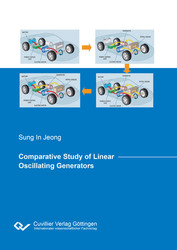| Areas | |
|---|---|
| Serie de libros (96) |
1381
|
| Nachhaltigkeit |
3
|
| Gesundheitswesen |
1
|
| Letra |
2370
|
| Ciencias Naturales |
5408
|
| Ciencias Ingeniería |
1795
|
| Ingeniería | 292 |
| Ingeniería mecánica y de proceso | 862 |
| Ingeniería eléctrica | 688 |
| Mineria y metalurgía | 30 |
| Arquitectura e ingeniería civil | 75 |
| General |
98
|
|
Leitlinien Unfallchirurgie
5. Auflage bestellen |
|
Erweiterte Suche
Comparative Study of Linear Oscillating Generators (Tienda española)
Sung In Jeong (Autor)Previo
Indice, PDF (76 KB)
Lectura de prueba, PDF (490 KB)
This dissertation presents the comparative study of linear oscillating generators using mainly equivalent magnetic circuit through the comparison of each topology ; Cartesian topology, cylindrical topology, hybrid stepping generator, tubular reluctance machine, and transverse flux machine. It is investigated by optimal process, geometrical structures, excited types, and number of phases and number of pole pairs in accordance with each topology.
Among the five proposed topologies, the optimal topology is selected by advantages / disadvantages of each topology, academic difference of single- and three-phase, and comparative evaluation by weight factors. The detailed design of the optimal model takes the magnetic saturation effects into account. Besides, the losses will be examined not only iron loss such as hysteresis and eddy-current by various materials but also cooper loss and eddy-current loss of PM.
Of importance is also thermal and mechanical robustness, because the generator is usually operating in close vicinity to the combustion chamber and has to withstand high accelerations resulting from the oscillating masses. Therefore, it is achieved by fatigue analysis based on the kinetic equation considering mechanical load and the operating frequency respectively.
The results of this study will give elaborate information about the design rules and the performance data of linear oscillating gensets.
| ISBN-13 (Impresion) | 9783736991170 |
| ISBN-13 (E-Book) | 9783736981171 |
| Formato | A5 |
| Idioma | Inglés |
| Numero de paginas | 228 |
| Laminacion de la cubierta | Brillante |
| Edicion | 1 Aufl. |
| Lugar de publicacion | Göttingen |
| Lugar de la disertacion | Braunschweig |
| Fecha de publicacion | 06.10.2015 |
| Clasificacion simple | Tesis doctoral |
| Area |
Ciencias Ingeniería
Ingeniería automotriz Ingeniería eléctrica general Arquitectura |








